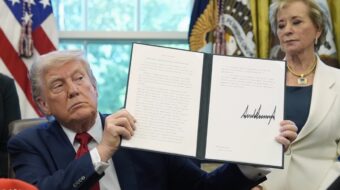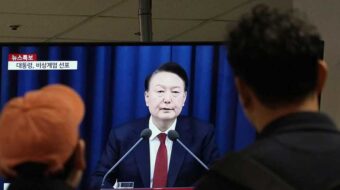News Analysis
“U.S. ASSAILS NORTH KOREA,” screamed the headlines of The New York Times a week ago when the North Korean government announced its decision to withdraw from the Nuclear Non-Proliferation Treaty.
That headline may sell papers, but it is inaccurate. A more appropriate headline would have been, “Bush administration furious with North Korea’s decision to walk away from treaty obligations.”
Not surprisingly, Asian governments and people around the world reacted differently. While they are deeply concerned about decision of the North Korean government to abandon the treaty and support the demilitarization of the Korean Peninsula, nearly every government attached the main responsibility for the present crisis to the Bush administration.
Had the Bush people pursued a policy that accented negotiation, cooperation, treaty compliance and mutually beneficial relations, the Korean peninsula would have never turned into a potential flashpoint of confrontation.
For some time the government of North Korea has sought to break free of the isolation imposed as a result of the Cold War. It desires to normalize relations with neighboring countries and the U.S. And in recent years other governments in the region – especially the South Korean – have expressed a similar desire.
None of the Asian governments want to continue the seemingly endless cycle of hostility and recrimination, sanctions, military buildup and all the attendant dangers that have been embedded in the fabric of interstate relations in their region for the past half century.
Instead, what they prefer is a policy grounded in reciprocity, reconciliation and demilitarization.
This makes eminently good sense in an age when the production of weapons of mass destruction has become much easier – and much more deadly.
What impedes this transition is, you guessed it, the Bush administration.
From its first days in office, Bush policymakers have been hostile toward the Pyongyang government. First, it reneged on commitments made by the Clinton administration. Then it walked away from the ABM treaty and announced its intention to build a $60 billion missile defense system in Alaska, not far, as the crow flies, from the borders of North Korea.
Then in his 2002 State of the Union address, Bush designated North Korea as a member of the “axis of evil. And if this wasn’t bad enough, the administration declared that it would preemptively strike North Korea, including with weapons of mass destruction.
At the same time, Bush showed contempt for the reconciliation steps of the two Korean states. But most ominous for the North Koreans is the U.S.’s relentless push for war against Iraq, another member of the “axis of evil.”
Against this background, is it surprising that public officials in Pyongyang are thinking “we’re next” or are considering reactivating their nuclear weapons program although it has not done so yet?
Herein lies the bitter fruit of Bush’s foreign policy. Rather than creating the conditions for a world without weapons of mass destruction and terrorism, this policy heightens tensions and the danger of war to the extreme, encourages the proliferation of weapons of mass destruction and brings closer the unthinkable and unimaginable – a nuclear holocaust.
It also makes individual terrorists’ acts much more likely.
In recent days, spokespeople for the Bush administration has toned down its saber-rattling rhetoric about North Korea. But, the North Koreans must wonder whether the change is substantive or is it just temporary, designed to give U.S. imperialism breathing space while it zeroes in on Iraq.
We will find out in time, but in any case, the easing of tensions buys time to find a negotiated and peaceful solution to the crisis. Such a solution is in the interest of all of the states in the region and all of humankind.
The world must move away from the use of weapons of mass destruction and pre-emptive strikes. But its journey should not be a backward one to the days of deterrence and confrontation, but rather forward to a world in which the renunciation of force in international relations, broad scale disarmament by all governments, beginning with our own, respect for the sovereignty of big and small states alike, and equitable economic relations between rich and poor countries are the standards governing the world community.
Sounds utopian? Not really because the conventional wisdom of the past century of securing peace through military strength and the waging of war is literally a dead end. In this era of weapons of mass destruction, a new wisdom must arise that says that a peaceful world can only be won by peaceful means.
During the long night of the Cold War, nuclear weapons were employed only once, when the U.S. military dropped, to our everlasting shame, atomic bombs on Hiroshima and Nagasaki, instantly vaporizing tens of thousands and killing over time nearly 200,000 innocents.
In the 21st century, the loss of human life could be on a much vaster scale. We must close down that possibility. Another world is possible. Let’s take our first steps by winning a peaceful resolution to the crisis on the Korean Peninsula as well as in Middle East.
Sam Webb is the national chairman of the Communist Party USA.
He can be reached at swebb@cpusa.org









